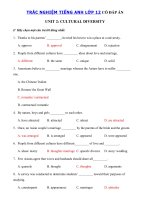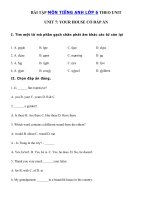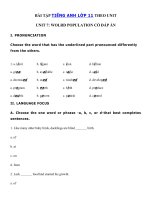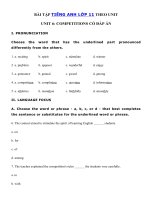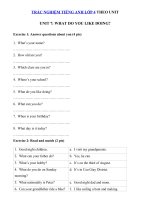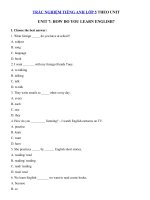Tải Trắc nghiệm tiếng Anh lớp 12 Unit 4 School education system - Bài tập Unit 4 lớp 12 School education system có đáp án
Bạn đang xem bản rút gọn của tài liệu. Xem và tải ngay bản đầy đủ của tài liệu tại đây (153.42 KB, 15 trang )
<span class='text_page_counter'>(1)</span><div class='page_container' data-page=1>
<b>ÔN TẬP </b>
<b>TIẾNG ANH LỚP 12 </b>
<b> THEO TỪNG UNIT</b>
<b>UNIT 4: SCHOOL EDUCATION SYSTEM</b>
<i><b>I. Hãy chọn một câu trả lời đúng nhất:</b></i>
1.
<b>In Vietnam, children from the age of six must go to school. </b>A. compulsory B. optional C. choosing D. volunteered
2. Schooling is _______ for all English children from the age of six to sixteen.
A. optional B. pioneer C. compulsory D. plastically
3. In England, an _______ year runs from September to July.
A. academy B. academic C. academically D. academies
4. A school year in England _______ into three terms.
A. is dividing B. divides C. are divided D. is divided
5. A school year in Vietnam usually _______ in September and _______ in May.
A. begins/ ends B. starts/ last C. ends/ starts D. departs/ starts
6. In England, each term _______ by a one-week break called half term.
A. divides B. educates C. puts into force D. is separated
7. An academic year in Vietnam _______ into two semesters.
A. struggles B. is divided C. tear away D. educates
8.
<b>In a school year in Vietnam, there are two terms called the first term and the second term. </b></div>
<span class='text_page_counter'>(2)</span><div class='page_container' data-page=2>
9. There are two _______ school systems in England; i. e. , state school system and public
school ones.
A. parallel B. paragraph C. paradise D. pyramid
10. State school system in England is _______ for all students and _______ by the state.
A. free/ pays B. free/ paid C. fee-paying/ paid D. fee-paid/ pays
11. School system in England is divided into two_______ consisting of the state and the public
ones.
A. levels B. schools C. years D. categories
12. The state school system in England has two _______ of education: primary education and
secondary education.
A. levels B. subjects C. terms D. semesters
13. The National _______ is set by the Government and must be followed by in all state
schools.
A. Stadium B. Curriculum C. Gallery D. Circus
14. In English schools, English, Math and Science are_______ subjects.
A. more B. store C. score D. core
15. Core subjects in Vietnamese schools_______ of Math, Literature and English.
A. makes for B. makes of C. are made up D. will make by
16. Core subjects are _______ in national exams at certain stages of the school education
system.
</div>
<span class='text_page_counter'>(3)</span><div class='page_container' data-page=3>
17. When do children in Vietnam go to _______? – They begin to go to school at the age of six.
A. High School B. Nursery C. Secondary School D. Primary School
18. How long does the _______ in Vietnam last? – Five years.
A. Primary Education B. Pre-school C. Secondary Education D. Higher Education
19. How long does the _______ in England last? – Five years.
A. Primary Education B. Pre-school C. Secondary Education D. Higher Education
20. In England, school fee in state schools is _______.
A. on sale B. free-paying C. well-paid D. for rent
21. In Vietnam, a stage of study for children aged from 11 to 17 is called_______.
A. Primary Education B. Pre-school C. Secondary Education D. Higher Education
22. My nephew is four years old, he may enter a _______ in Vietnam.
A. High School B. Kindergarten C. Secondary School D. Primary School
23.
<b>In England, schooling is compulsory for all children from the age of 5 to 16. </b>A. put into blush B. put on clothes C. put into force D. taken off
24. In Vietnam, schooling is _______ for all children from the age of three to five.
A. optional B. obliged C. compulsory D. compulsive
25. Schooling for Vietnamese children from the age of six to fourteen is _______.
A. optional B. odd C. compulsory D. nursery
26. How long does the whole Secondary Education in Vietnam last? – _______ years.
</div>
<span class='text_page_counter'>(4)</span><div class='page_container' data-page=4>
27. In Vietnam, _______ lasts five years from grade one to grade five.
A. Senior High School B. Secondary Education C. Pre-school D. Primary
Education
28. In Vietnam, children may have _______ whether to continue studying or not.
A. thirst B. obligations C. choices D. compulsions
29. Many high school students in Vietnam have to work very hard to _______ at a university.
A. win a place B. get a cold C. lose touch with D. keep pace with
30. Nowadays, Vietnamese students have to study more _______ than those of twenty years
ago to keep pace with the developments of modern society.
A. substitute B. subjects C. subways D. subjunctives
31. The _______ year in Vietnam runs from September to June and is divided into 2 terms
A. academically B. academical C. academic D. academicals
32. Children at the age of 11 start moving to _______ school.
A. kindergarten B. primary school C. lower secondary D. upper secondary
33. Children receive its early ____ at home so parents should buy some _______ magazines to
put them in the bookcase.
A. educational/ educate. B. educational/education.
C. education/ educational. D. education/ educated.
34. Schools in which all students can attend without paying tuition _______ are public schools.
A. fees B. charge C. payment D. bill
</div>
<span class='text_page_counter'>(5)</span><div class='page_container' data-page=5>
A. into B. to C. from D. on
36. _______ the end of the school year, students take an exam in each subject.
A. On B. To C. In D. At
37. Students usually _______ their GCSE at the age of sixteen.
A. pass B. make C. take D. follow
38. School boards are usually made _______ of people who live in the area, often parents of
children in the school.
A. up B. of C. into D. over
39. Tommy left high school _______ the age _______ seventeen.
A. at/ of B. in/ for C. on/ with D. of/ in
40. The academic year in Vietnam is over _______ the end _______ May.
A. from/ in B. for/ on C. on/ in D. at/ of
41. The telephone _______ by Alexander Graham Bell.
A. is invented B. is inventing C. invented D. was invented
42.
The school library is open ___ all of the students and the teaching staff of the school.A. for B. over C. to D. among
43.
Fee-paying schools are often called"independent schools","private schools" or “_______schools"
A. college B. primary C. secondary D. public
</div>
<span class='text_page_counter'>(6)</span><div class='page_container' data-page=6>
A. state B. secondary C. independent D. primary
45. Mathematics, a required subject in all schools, is _______ into many branches.
A. grouped B. prepared C. divided D. added
46. Education has been developed in _______ with modern industry and the mass media.
A. compulsory B. parallel C. selected D. following
47.
<b>School uniform is compulsory in most of Vietnamese schools. </b>A. depended B. required C. divided D. paid
48. In England schooling is compulsory _______ all children from the age of 5 to 16.
A. with B. for C. to D. over
49. In Vietnamese schools, English, mathematics, and literature are three _______ subjects,
which are compulsory in many important national examinations.
A. core B. part C. center D. middle
50. The national _______ is a program of study in all the main subjects that children aged 5 to
16 in state schools must follow
A. syllabus B. course C. plan D. curriculum
51. For the government, education is now at the top of _______.
A. agenda B. outline C. order D. plan
52. We want the kids to have the best _______ education
A. probable B. possible C. possibly D probably
53. Watching TV can be very _______.
</div>
<span class='text_page_counter'>(7)</span><div class='page_container' data-page=7>
54. The expansion of _______ education at college and university should be a powerful force
for change
A. further B. higher C. extra D. extended
55. Most children in the UK remain in _______ education until they are at least 16years.
A. full B. full – period C. full time D. part time
56. We have to _______ an exam at the end of the course.
A. write B. do C. take D. make
57. Many students now have been paid for _______ during terms.
A. employ B. employed C. unemployment D. employees
58. She wants to take a career _______ in order to have children.
A. leave B. stop C. end D. break
59. For _______ information on the diet , write to us at this address.
A. further B. addition C. most D. worse
60. “Those eggs of different colors are very artistic “. Yes , they _______ in Russia.
A. were painted B. were paint C. were painting D. painted
61. “David is in prison for smoking drugs”. He _______ that it was against the law.
A. is telling B. was told C. told D. tells
62. “The maintenance people didn’t remove the chairs from the hallroom”. “Don’t worry. They
_______ them before the dance begins”.
A. will have been moved
B. will have moved</div>
<span class='text_page_counter'>(8)</span><div class='page_container' data-page=8>
63. _______ that military spending is extremely high.
A. we are felt B. it feels C. it is felt D. we feel that it is
64. If you want to learn a new language , you must _______ foreign language classes.
A. follow B. present C. attend D. assist
65. My favorite _______ at school is history.
A. topic B. class C. theme D. subject
66. His school report last term was very _______.
A. satisfied B. fulfilling C. satisfactory D. full
67. The students _______ to be at school by the teacher at 8 :00 am.
A. tell B. told C. have told D. were told
68. Our children _______ to school by bus every morning
A. take B. are taken C. have taken D. are taking
69. We have no seats left for the concert next Sunday
A. All the seats for the concert next Sunday have been booked
B. All the seats were sold for the concert next Sunday
C. The concert next Sunday had no seats for us
D. No seats left for us for the concert next Sunday
70. Students in public school in England have to pay _______.
A. free B. tuition fee C. fee-paying D. freedom
</div>
<span class='text_page_counter'>(9)</span><div class='page_container' data-page=9>
1.
Schooling is optional to all English children from the age of 6 to 15. A B C D
2.
Children in England may choose between public schools and independent schools to A B C D
study.
3.
There are two semesters in an academic year in schools in England.A B C D
4.
Children in Vietnam have to study twelve years from grade one to grade twelve.A B C D
5.
An academic year in Vietnam consists of three terms from September to May.A B C D
6.
Each term in a school year in England is separated by one-month break called half term.A B C D
7.
The state school system in England can be divided into three levels of education.A BC D
8.
A school year in Vietnam usually begins in late September every year.A B C D
9.
In Vietnam, schooling is compulsory for all children from the age of three to five. A B C D
</div>
<span class='text_page_counter'>(10)</span><div class='page_container' data-page=10>
A B C D
11.
Great singers of the world can be hearing at the Sydney Opera House A B C D
12.
Don’t all of us want to be loved and need by other people ?A B C D
13.
The price of rice exports will been increased by the governmentA B C D
14.
Does Dr Brown mind calling at home if his patients need his help ?A B C D
15.
Most of the jobs in the manufacturing factories will take over by robotsA B C D
<i><b>III. Hãy đọc đoạn văn và chọn một câu trả lời đúng nhất cho mỗi câu hỏi theo sau:</b></i>
"Where is the university?" is a question that many visitors to Cambridge ask, but no one can
give them a clear answer, for there is no wall to be found around the university. The university is
the city. You can find the classroom buildings, libraries, museums and offices of the university
all over the city. And most of its members are the students and teachers or professors of the
thirty-one colleges.
Cambridge was already developing town long before the first students and teachers arrived
800 years ago. It grew up by the river Granta, as the Cam was once called. A bridge was built
over the river as early as 875.
</div>
<span class='text_page_counter'>(11)</span><div class='page_container' data-page=11>
Cambridge became a city in 1951 and now it has the population of over 100,000 many young
students want to study at Cambridge. Thousands of people from all over the world come to visit
the university town. It has become a famous place all round the world.
1. Why do most visitors come to Cambridge?
A. To see university.
B. To use the libraries of the university.
C. To study in the colleges in Cambridge.
D. To find the classroom buildings.
2. Around what time did the university begin to appear?
A. In the 8th century B. In the 9th century
C. In the 13th century D. In the 15th century
3.
Why did people name Cambridge the"city of Cambridge"?A. Because it was a developing town.
B. Because the river was very well - known.
C. Because there is a bridge over the Cam.
D. Because there is a river named Granta.
4. From what we read, we know that Cambridge is now _______.
A. a city without wall. B. a city that may have a wall around it.
C. visited by international tourists. D. a city of growing population.
5. After which year did the town really begin developing?
</div>
<span class='text_page_counter'>(12)</span><div class='page_container' data-page=12>
<i><b>IV. Chọn đáp án đúng nhất để hồn thành bài khóa dưới đây. </b></i>
If women choose to pursue a career once they have children, they often miss out on a close
(1) _______with their children. Helen Jamieson is a mother of three who has given (2)
_______work to look after her children full-time. She strongly believes that women are
pressurized to do too much, driving themselves to the absolute limit. In her own case, after six
years of paid employment, Helen finally decided to call it a day. She says she initially found it
hard being at home, though she never misses the job itself. She admits that if she had had a
brilliant career to begin (3) _______, she might feel differently now. Financially, she is no worse
off (4) _______ before, as the cost of childcare and commuting exceeded her actual income. (5)
_______the government starts to give other tax incentives to working parents, she says she will
not return to the workplace until her children are grown up.
1.
A. relationship B. friendship C. scholarship D. membership2.
A. in B. to C. out D. up3.
A. to B. up C. at D. with4.
A. than B. so C. as D. then5.
A. Unless B. Even if C. Provided D. If<i><b>V. Hãy chọn một câu trả lời đúng nhất:</b></i>
1.
"Those eggs of different colors are very artistic." -"Yes, they ______ in Russia."A. were painted B. were paint C. were painting D. painted
2.
"David is in prison for smoking drugs." -"He ______ that it was against the law."</div>
<span class='text_page_counter'>(13)</span><div class='page_container' data-page=13>
3.
"The maintenance people didn't remove the chairs from the ballroom." -"Don't worry. They______ them before the dance begins."
A.
will have been moved B. will have movedC. were moved D. moved
4. Gold ______ in California in the 19th century.
A.
was discovered B. has been discoveredC. was discover D. they discovered
5. ______ that military spending is extremely high.
A. We are left B. It feels C. It is felt D. We feel that it is
6. All planes ______ before departure.
A. will check B. will have checked C. will be checked D. will be checking
7. I wanted ______ by the head of the company, but it was impossible.
A. to see B. to be seen C. seeing D. being to see
8. Nancy ______ at Bob's house every night this week.
A. has been eaten B. has eating C. is being eaten D. has been eating
9.
"Where did you get these old dresses?" -"We ______ them in the old trunk."A. were found B. finding C. found D. have been found
10.
"What happened to the old mail carrier?" -"He ______ to a new neighborhood to work."A. has sent B. was send C. was sent D. sent
</div>
<span class='text_page_counter'>(14)</span><div class='page_container' data-page=14>
A. was catching B. caught C. was caught D. catch
12.
"I heard you decided to take up tennis. ” -"Yes, I have ______ every day."A. been played B. been playing C. playing D. play
13.
"Are we about to have dinner?" -"Yes, it ______ in the dining room."A. is serving B. serves C. is being served D. served
14.
"Why is Tony in prison?" -"He ______ of robbery."A.
has been convicted B. has been convictingC. has convicted D. convicted
15.
"Where are Jack and Joseph?" -"They ______ the boxes you asked for into the house."A.
have been bringing B. bringingC. have been brought D. to bring
16.
"Where's the old chicken coop?" -"It ______ by a windsorm last year."A. destroy B. is destroyed C. was destroyed D. destroyed
17.
"We're still looking for Tom?" -"Hasn't he ______ yet?"A. been found B. to find C. found D. being found
18.
"Whatever happened to that fortune-teller?" -"I don't know. She __ around here in a longtime."
A. hasn't seen
B. didn't seeC. hasn't been seeing D. hasn't been seen
</div>
<span class='text_page_counter'>(15)</span><div class='page_container' data-page=15>
A. has been dancing B. has been danced C. is dancing D. was danced
20.
"What a beautiful dress you're wearing!" - "Thank you. It ______ especially for me by aFrench tailor."
A. is made B. has made C. made D. was made
Mời bạn đọc tham khảo thêm tài liệu Tiếng Anh lớp 12 tại đây:
Bài tập Tiếng Anh lớp 12 theo từng Unit:
Bài tập Tiếng Anh lớp 12 nâng cao:
Bài tập trắc nghiệm trực tuyến Tiếng Anh lớp 12:
</div>
<!--links-->
Tải Trắc nghiệm tiếng Anh lớp 12 Unit 5: Higher Education có đáp án - Tiếng Anh 12 Unit 5 Higher Education| Bài tập Unit 5 lớp 12 có đáp án
- 10
- 371
- 2
